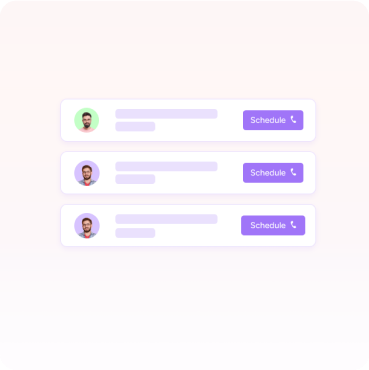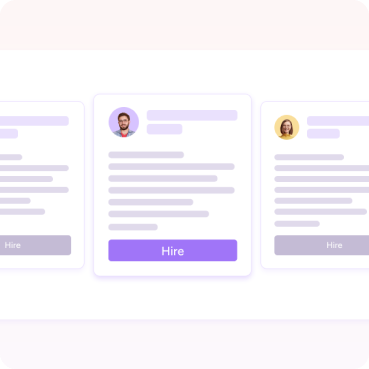Regular hiring
High RiskHire Laravel Developers of Silicon Valley caliber
Hire pre-vetted full time remote Laravel Developers from India. Hire now and build your dream engineering team with Hyno
Join 4,000+ companies already growing








Our Top Remote Developers
Hyno conducts rigorous testing and carefully vets the developers who are fueled by passion and skill sets. Hence, our developer community is the foundation for innovation and collaboration, bringing ideas and projects to fruition.
OUR STANDARDS
Hyno vs. Your regular recruitment process.
Find a risk-free, pre-interviewed, high-quality developer who is remote-ready in less than 2 weeks at 40% less cost.
Parameters
Choose the right for your firm.Time
Fees
Quality
Pre Screening
Remote readiness check
Termination
Failure rate
1 - 4 Months
> $1000
High
Low
Freelancing
High Risk1 - 2 Months
No fee
No
Very high
 Low Risk
Low Risk
0 - 15 Days
No fee
No
Very low
Pricing Starts from $35/hr
Accomplishing everything in just 3 steps
Our technical manager aligns the required skillset and tech stack with our talent pool to help you find the best fit.

Shortlisting candidates
Precise Hiring: Understanding, Gathering, and Shortlisting nittygritty.
-
 We start by thoroughly understanding your unique needs and specifications.
We start by thoroughly understanding your unique needs and specifications.
-
 check markWe
align the developer details with company goals. This way, we tailor the candidate
selection to seamlessly integrate with the organization’s vision and goals.
check markWe
align the developer details with company goals. This way, we tailor the candidate
selection to seamlessly integrate with the organization’s vision and goals.


Scheduling an Interview
Effortless talent selection: Finding your perfect match
-
 We connect you with the chosen candidates to ensure a personalized experience.
We connect you with the chosen candidates to ensure a personalized experience.
-
 Our rigorous
selection process guarantees that you find candidates who align seamlessly with your
requirements.
Our rigorous
selection process guarantees that you find candidates who align seamlessly with your
requirements.


Onboarding the talent
Streamlined onboarding for peak performance.
-
 The selected/qualified talent integrates smoothly through structured onboarding to
quickly adapt to projects, processes, and team dynamics.
The selected/qualified talent integrates smoothly through structured onboarding to
quickly adapt to projects, processes, and team dynamics.
-
 We go beyond
integration to offer ongoing support for a seamless transition to ensure that the
new talent exceeds your expectations.
We go beyond
integration to offer ongoing support for a seamless transition to ensure that the
new talent exceeds your expectations.


Read hiring guide
A one-stop shop to hiring the right Laravel Developer
How to hire a Laravel Developer? Skills to look for, interview questions, and more
Hiring a dedicated developer for your business can
be a cumbersome task. As many companies are competing to hire top Laravel
developers,
so finding a good developer is not as easy as it may seem.
We're here to assist all employers who choose to hire Laravel Developer on
their
own. Recruiting a developer on your own requires a fair amount of software
development experience in general. However, if you're a non-technical manager
interested in learning more about how to hire a Laravel Developer, we've put
up
an excellent resource for you.
Things to check Key Skills Required for a Laravel Developer?
The following are the key skills that a developer should possess to become proficient in Laravel:
1. Laravel Framework: The candidate should have a strong understanding of the Laravel framework and its core components, such as routing, middleware, and controllers.
2. PHP: : Laravel is built on top of the PHP programming language, so the candidate should have a solid understanding of PHP fundamentals, including object-oriented programming, database connectivity, and web server configuration.
3. Database Design: Laravel provides a powerful Object-Relational Mapping (ORM) layer that allows developers to work with databases in a more intuitive way. The candidate should have experience designing and optimizing database schemas.
4. Front-end Technologies: : Laravel works seamlessly with a variety of front-end technologies such as HTML, CSS, and JavaScript, and the candidate should be familiar with these technologies and have experience building responsive user interfaces.
5. Testing: The candidate should have experience with automated testing frameworks, such as PHPUnit or Codeception, and be able to write test cases for both unit and integration tests.
6. Version Control: The candidate should be comfortable using version control systems such as Git, and understand branching and merging strategies.
7. DevOps: : Laravel is often used in complex application deployments, so the candidate should have experience with deployment tools and techniques, such as Docker, Kubernetes, and CI/CD pipelines.
Ideal Hiring Process for Laravel Developer
1. Define the job requirements: Before you start looking for candidates, you need to define the job requirements. This should include the technical skills and experience required for the position, as well as the soft skills and qualities you are looking for in a remote employee.
2. Post the Job Listing: Once you have defined the job requirements, you should post the job listing on job boards and online communities where Laravel developers are likely to hang out.
3. Review Applications: When you start receiving applications, you should review them carefully to identify the candidates who meet your job requirements. This may include reviewing their resumes, portfolios, and code samples.
4. Conduct Initial Interviews: After you have identified promising candidates, you should conduct initial interviews to get a better sense of their technical skills, experience, and communication abilities. This can be done via video conferencing tools like Zoom or Google Meet.
5. Conduct Technical Assessment: Once you have shortlisted candidates, you should conduct a technical assessment to evaluate their proficiency with Laravel and related technologies. This can include a coding challenge or asking them to walk you through a project they have worked on previously.
6. Check references: Contact the candidate's references to confirm their work experience, communication skills, and work habits.
7. Offer the job: Once you have identified the best candidate, make a job offer that includes salary, benefits, and any other relevant details.
8. Onboard the developer: Provide a clear onboarding plan that outlines expectations, deliverables, and communication channels. You can also schedule regular check-ins and progress reviews to ensure that the developer is meeting expectations.
Important Interview questions to ask to Hire a Laravel Developer
What is your experience with Laravel?
The candidate should talk about their experience with Laravel, including how long they've been working with the framework, any notable projects they've completed, and any specific challenges they've faced and how they overcame them.
What is your understanding of MVC architecture, and how does Laravel implement it?
The candidate should be able to explain the Model-View-Controller (MVC) architecture and how it's implemented in Laravel. They should be able to talk about how Laravel's routing, controllers, and views work together to create a cohesive web application.
Have you worked with Laravel's Eloquent ORM before?
If so, can you give an example of a complex query you've written using Eloquent? Answer: The candidate should be able to demonstrate their understanding of Laravel's Eloquent ORM and how it simplifies database interactions. They should provide an example of a complex query they've written using Eloquent, including how they used relationships between tables to fetch data.
Have you used Laravel's Blade templating engine?
If so, what are some of its advantages over other templating engines? Answer: The candidate should be able to explain how Laravel's Blade templating engine works and how it simplifies the creation of reusable UI components. They should also talk about how Blade's syntax makes it easy to extend layouts and create custom directives.
What is your experience with testing in Laravel? Do you use PHPUnit, Laravel Dusk, or both?
Answer: The candidate should be able to talk about their experience with testing in Laravel and which tools they use. They should be able to explain how they write tests for controllers, models, and views, and how they ensure their code is robust and error-free.
Can you explain how Laravel's event system works, and how you've used it in your projects?
The candidate should be able to explain how Laravel's event system works and how it simplifies the implementation of event-driven architecture. They should provide an example of a project they've worked on where they used Laravel's event system to trigger actions in response to specific events.
What is your experience with RESTful APIs, and how have you used Laravel to build them?
APIs using Laravel. They should provide an example of a project where they used Laravel to create an API, including how they implemented authentication and handled data validation.
How do you ensure the security of your Laravel applications, and what steps do you take to prevent common vulnerabilities like SQL injection and cross-site scripting?
The candidate should be able to talk about how they ensure the security of their Laravel applications, including using secure authentication methods and input validation. They should also talk about how they prevent common vulnerabilities like SQL injection and cross-site scripting.
Can you provide an example of a performance optimization you've made in a Laravel application?
The candidate should be able to provide an example of a performance optimization they've made in a Laravel application, such as caching frequently accessed data or optimizing database queries. They should also explain how they measured the performance improvement and how it impacted the application's user experience.
What experience do you have with version control systems, and how do you use them in your development workflow?
I have experience with version control systems such as Git, which I use to manage changes to my codebase and collaborate with other developers. I use Git to track changes to my code, create branches for new features or bug fixes, and merge changes back into the main codebase.
Job Description Template for Laravel Developer
Location: [Insert Location]
Job Title: Laravel Developer
Position Type: Full-Time
Salary: [Insert Salary Range]
We are seeking a highly skilled Laravel Developer to join our development team. The Laravel Developer will be responsible for designing, developing, and maintaining web applications using Laravel, as well as ensuring the quality and scalability of our applications. The ideal candidate will have a strong understanding of Laravel, PHP, MVC architecture, and web application development.
Key Responsibilities:
- Design and develop web applications using Laravel framework
- Collaborate with cross-functional teams to define, design, and ship new features
- Write clean, maintainable, and testable code
- Identify and address performance bottlenecks
- Participate in code reviews and ensure code quality and scalability
- Troubleshoot and debug issues in a timely manner
- Stay up-to-date with industry trends and new technologies
Requirements:
- Bachelor's or Master's degree in Computer Science or a related field
- At least 3 years of experience in web application development using Laravel framework
- Strong understanding of PHP, MVC architecture, and object-oriented programming
- Experience with front-end technologies such as HTML, CSS, and JavaScript
- Experience with relational databases such as MySQL and PostgreSQL
- Familiarity with Git and version control systems
- Knowledge of RESTful API design and development
- Ability to write clean, maintainable, and testable code
- Strong problem-solving and analytical skills
- Excellent communication and collaboration skills
Preferred Qualifications:
- Experience with Vue.js or other front-end frameworks
- Familiarity with AWS or other cloud platforms
- Experience with agile development methodologies
We offer a competitive salary, comprehensive benefits package, and opportunities for career growth and advancement. If you are a highly skilled Laravel Developer who is passionate about creating innovative web applications, we encourage you to apply.